Here's my story on "10 Reasons to Use a Typewriter Today" — renamed by the editors of Rodale's Organic Life as "10 Non-Hipster Reasons To Use A Typewriter Instead Of A Laptop." (Personally I don't mind hipsters.) Hope you enjoy it.
10 Reasons to Use a Typewriter Today
Richard Polt
I’m drafting this story on a typewriter—a Gossen Tippa Pilot, a sleek West German “laptop” of the ’50s.
What am I? A madman? A masochist? What possessed me to tote a mechanical writing machine to the patio this sunny afternoon, instead of the far more efficient and flexible laptops of today?
If I’m a madman, at least there are many more in the madhouse. You may run across 21st-century typists writing poems for passers-by; typing a blog post to be photographed and uploaded; using type and ink to sketch a scene; playing the typewriter as a percussion instrument; tapping away at a digital detox party, where phones are checked at the door; or joining others for a letter-writing session. For my book The Typewriter Revolution (Countryman Press, November 2015), I interviewed 50 writers, artists, activists, kids, teachers, and inventors who share my feeling about typewriters: love.
Is there something we know that the general public doesn’t? Can we give you one good reason why you should use a typewriter in this day and age?
No. We can give you ten.
1. Sustainability. Digital devices are churned out under questionable labor conditions, suck up energy every day, and become hazardous e-waste within a few years. But a manual typewriter will work for decades, powered only by your own muscles. It’s healthy exercise that never pollutes. As for paper, look around and you’ll find reams that go to waste every day. Lighten the load of the recycling bin and use that paper to record your thoughts. The earth will thank you.

2. Durability. How many things do you own that were built before your birth and are likely to survive your death? Precious few, I bet. But the high-quality typewriters of the twentieth century were made to last. You can learn to maintain them with a little care and common sense. Ribbons are still readily available. There’s nothing to stop you from using your typewriter for the rest of your life. Your personalities will rub off on each other over the years.
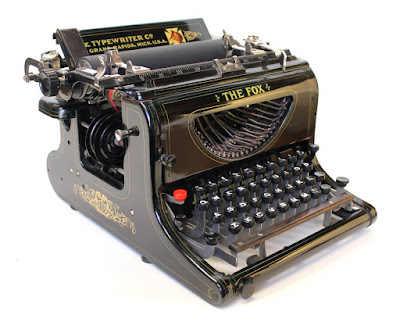
3. Focus. A typewriter was made to do one thing: type. On a computer, it’s so easy to give in to the temptation to check something else when the going gets tough. It’s an attention deficit supermarket. A typewriter invites you to sink into writing—no turning back, no multitasking, charging ahead clear-sightedly and decisively.
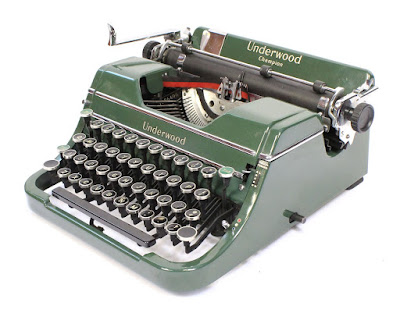
4. Privacy. We all know by now that anything we do digitally may be visible to hackers, corporations, governments, or the planet at large. The world is looking over your shoulder. But a typewriter is a truly private machine; it doesn’t store your words, and your typing will be read by no one but you unless you choose to share. It’s refreshing to know that your writings are truly your own—and it’s no wonder that top-secret agencies from the Kremlin to MI6 rely on typewriters today.
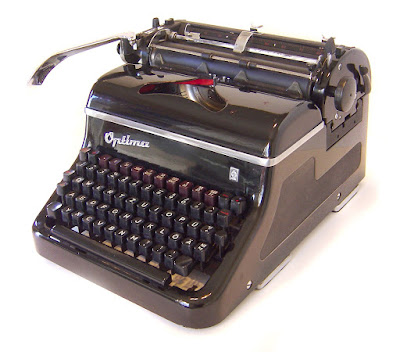
5. Self-reliance. With no need for electricity, software updates, incomprehensible legal agreements, or mysterious chips, your manual typewriter really belongs to you. It cultivates independence and allows you to understand your own tools. That’s a healthy relationship to your things, your activities, and your words.
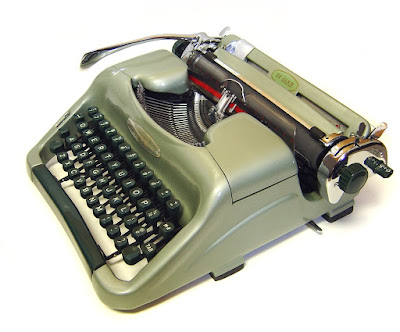
6. Correspondence. We’ve never had more “friends,” but a real friend is hard to find, and digital communication always involves barriers and ambiguities that tend to keep relationships superficial. Sometimes a slower approach is more powerful. Type a letter to your friend; when she receives it days later, I guarantee that she’ll be touched.
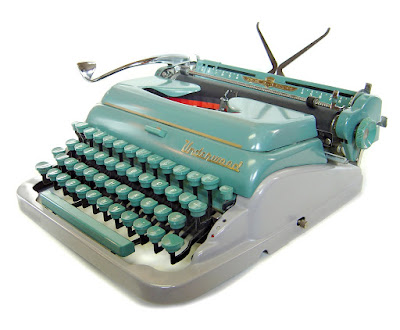
7. Connections. Typewriters can also create real-time connections. In many cities, you’ll find writers offering to compose stories or poems for the public on their trusty machines. The typewriters make the exchange real and dramatic; they create tangible texts that reflect people’s wishes and emotions. It’s not uncommon for a street poet to be repaid with a hug. And typewriter lovers are coming up with social ideas—type-ins, snail mail parties, public typing stations—so people can get together to make connections that go deeper than the digital.
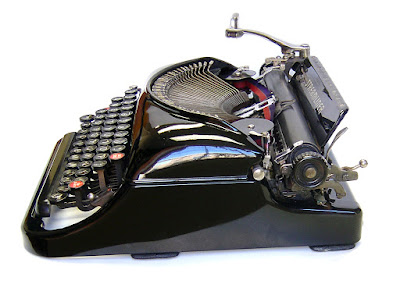
8. Compatibility. We 21st-century typists don’t hate digital devices; we just reject the all-digital mindset. When it’s time to connect the typewritten and digital worlds, it’s easier than you might think. A typescript can be scanned and turned into digital text. You can also take a snapshot of your typing and e-mail, tweet, or Instagram it. There’s even the USB Typewriter, a kit that adds digital capacity to a functioning manual typewriter, letting it do double duty as a keyboard or save your words to an SD card.

(courtesy of Jack Zylkin, usbtypewriter.com)]
9. Sensations. The click of the typebars and the ringing of the bell are a soundtrack that constantly rewards you for producing your text. (Want a quieter experience? Try a “noiseless” typewriter from the ’30s or ’40s.) The shapes and colors of a well-designed typewriter are more treats, as are the feel of a glass keytop, the heft of a carriage, and even the aroma of ink and oil. Using a typewriter just feels good.
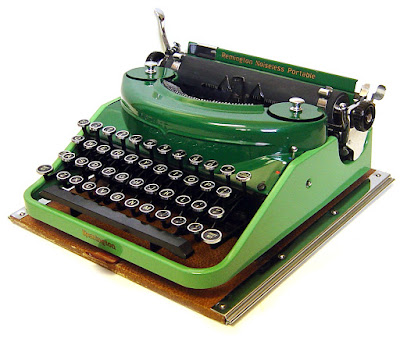
10. Non-efficiency. Typewriters aren’t for business anymore. I wouldn’t advise using one to write up that sales report that’s due at 9 AM tomorrow. No—they’re for fun. And when something is fun, getting it done as quickly as possible is a mistake. Enjoy the process, relax about the product, and savor the experience. Typewriting is like riding a bike, not like speeding down the Interstate. It’s about the journey, not the destination. Try a typewriter and glory in the non-efficient.
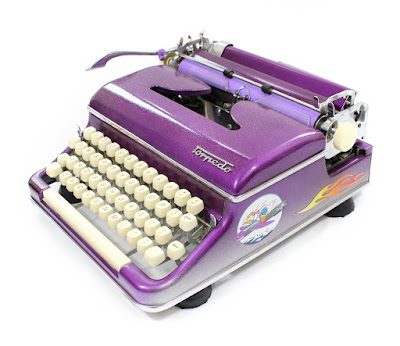
(Update, 2018: the story on the Rodale's website has disappeared—as has the whole website!—but here's the text.)
10 Reasons to Use a Typewriter Today
Richard Polt
I’m drafting this story on a typewriter—a Gossen Tippa Pilot, a sleek West German “laptop” of the ’50s.
What am I? A madman? A masochist? What possessed me to tote a mechanical writing machine to the patio this sunny afternoon, instead of the far more efficient and flexible laptops of today?
If I’m a madman, at least there are many more in the madhouse. You may run across 21st-century typists writing poems for passers-by; typing a blog post to be photographed and uploaded; using type and ink to sketch a scene; playing the typewriter as a percussion instrument; tapping away at a digital detox party, where phones are checked at the door; or joining others for a letter-writing session. For my book The Typewriter Revolution (Countryman Press, November 2015), I interviewed 50 writers, artists, activists, kids, teachers, and inventors who share my feeling about typewriters: love.
Is there something we know that the general public doesn’t? Can we give you one good reason why you should use a typewriter in this day and age?
No. We can give you ten.
1. Sustainability. Digital devices are churned out under questionable labor conditions, suck up energy every day, and become hazardous e-waste within a few years. But a manual typewriter will work for decades, powered only by your own muscles. It’s healthy exercise that never pollutes. As for paper, look around and you’ll find reams that go to waste every day. Lighten the load of the recycling bin and use that paper to record your thoughts. The earth will thank you.

2. Durability. How many things do you own that were built before your birth and are likely to survive your death? Precious few, I bet. But the high-quality typewriters of the twentieth century were made to last. You can learn to maintain them with a little care and common sense. Ribbons are still readily available. There’s nothing to stop you from using your typewriter for the rest of your life. Your personalities will rub off on each other over the years.

3. Focus. A typewriter was made to do one thing: type. On a computer, it’s so easy to give in to the temptation to check something else when the going gets tough. It’s an attention deficit supermarket. A typewriter invites you to sink into writing—no turning back, no multitasking, charging ahead clear-sightedly and decisively.

4. Privacy. We all know by now that anything we do digitally may be visible to hackers, corporations, governments, or the planet at large. The world is looking over your shoulder. But a typewriter is a truly private machine; it doesn’t store your words, and your typing will be read by no one but you unless you choose to share. It’s refreshing to know that your writings are truly your own—and it’s no wonder that top-secret agencies from the Kremlin to MI6 rely on typewriters today.

5. Self-reliance. With no need for electricity, software updates, incomprehensible legal agreements, or mysterious chips, your manual typewriter really belongs to you. It cultivates independence and allows you to understand your own tools. That’s a healthy relationship to your things, your activities, and your words.

6. Correspondence. We’ve never had more “friends,” but a real friend is hard to find, and digital communication always involves barriers and ambiguities that tend to keep relationships superficial. Sometimes a slower approach is more powerful. Type a letter to your friend; when she receives it days later, I guarantee that she’ll be touched.

7. Connections. Typewriters can also create real-time connections. In many cities, you’ll find writers offering to compose stories or poems for the public on their trusty machines. The typewriters make the exchange real and dramatic; they create tangible texts that reflect people’s wishes and emotions. It’s not uncommon for a street poet to be repaid with a hug. And typewriter lovers are coming up with social ideas—type-ins, snail mail parties, public typing stations—so people can get together to make connections that go deeper than the digital.

8. Compatibility. We 21st-century typists don’t hate digital devices; we just reject the all-digital mindset. When it’s time to connect the typewritten and digital worlds, it’s easier than you might think. A typescript can be scanned and turned into digital text. You can also take a snapshot of your typing and e-mail, tweet, or Instagram it. There’s even the USB Typewriter, a kit that adds digital capacity to a functioning manual typewriter, letting it do double duty as a keyboard or save your words to an SD card.

(courtesy of Jack Zylkin, usbtypewriter.com)]
9. Sensations. The click of the typebars and the ringing of the bell are a soundtrack that constantly rewards you for producing your text. (Want a quieter experience? Try a “noiseless” typewriter from the ’30s or ’40s.) The shapes and colors of a well-designed typewriter are more treats, as are the feel of a glass keytop, the heft of a carriage, and even the aroma of ink and oil. Using a typewriter just feels good.

10. Non-efficiency. Typewriters aren’t for business anymore. I wouldn’t advise using one to write up that sales report that’s due at 9 AM tomorrow. No—they’re for fun. And when something is fun, getting it done as quickly as possible is a mistake. Enjoy the process, relax about the product, and savor the experience. Typewriting is like riding a bike, not like speeding down the Interstate. It’s about the journey, not the destination. Try a typewriter and glory in the non-efficient.








































